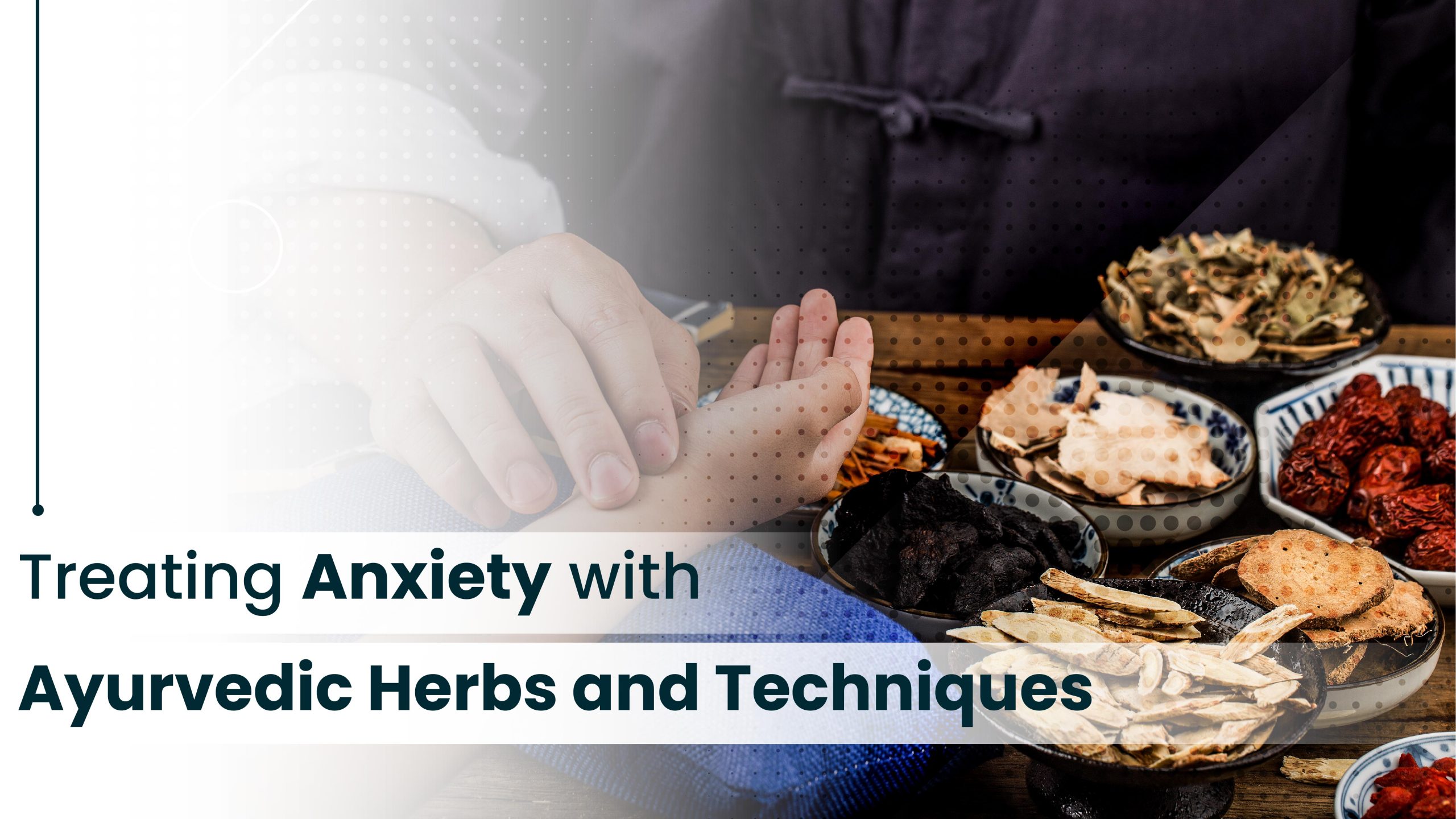TREATING ANXIETY WITH AYURVEDIC HERBS AND TECHNIQUES

Ayurvedic medicine is one of the ancient holistic medical practices of the Indian subcontinent. In recent decades, it has gained immense popularity all around the world. The ultimate reason behind this global acceptance of Ayurveda is its ability to treat a wide range of diseases with no or minimal side effects.
Still, people question whether Ayurveda treats mental ailments.
Let it be clear that Ayurveda has got exclusive medical procedures for both physical and mental ailments. Ayurvedic institutions like Mansarovar Ayurvedic Medical College(MAMC), the best ayurvedic hospital in India, have trained physicians for mental treatments.
Let this article provide insight into the ayurvedic treatment strategies for one of the mental ailments, anxiety.
What is Anxiety?
Anxiety is generally the feeling of fear, dread, and uneasiness that are expressed as intense sweat, restlessness, tense state, rapid heartbeat, etc.
According to the American Psychological Association (APA), anxiety is defined as an emotion characterized by feelings of tension, worried thoughts, and physical changes like increased blood pressure.
What are the symptoms of anxiety?
Anxiety is expressed via a variety of symptoms as follows:
- Restlessness
- Uncontrollable feelings of worry
- Difficulty concentrating
- Sleep difficulties
- Sense of impending danger, doom, or pain
- Increased heartbeat
- Hyperventilation
- Intensely sweating
- Trembling
Ayurvedic treatments for Anxiety:
Ayurveda has got its unique way of medications and treatments that includes herbal medicines, laxatives, yoga, meditations, special diets, and so on. Top ayurvedic hospitals like MAMC, an ayurvedic medical college in MP, use a variety of ayurvedic herbs to derive medical compositions that can treat anxiety.
Let us have a look at the ayurvedic herbs that are used to treat anxiety here.
Ayurvedic herbs for treating anxiety:
Here are the top 3 herbs that are used for treating anxiety:
Ashwagandha:
Ashwagandha is an evergreen herb with the scientific name Withania somnifera. This shrub is a powerful rejuvenating herb that has been used to produce drugs in Ayurvedic treatments for the past 2000 years.
Ashwagandha is considered an adaptogen that helps treat and control anxiety. According to the Indian Journal of Psychological Medicines, Ashwagandha controls and reduces the release of cortisol which is a major stress hormone. It also reduces the activity of the hypothalamic-pituitary-adrenal axis, a system in the body that regulates the stress response.
Brahmi:
Brahmi is a small, succulent, glabrous, creeping annual herb with the scientific name Bacopa monnieri. This herb is provided as a nerve tonic by ayurvedic practitioners to treat anxiety.
Brahmi acts as an adaptogen by lowering the level of cortisol and elevating mood. According to one of the rodent studies, the anti-anxiety effects of Brahmi are similar to those of lorazepam, a prescribed medication to treat anxiety.
Tulsi:
Tulsi is an aromatic perennial plant belonging to the genus Ocimum. Tulsi helps treat anxiety by addressing different modes of stress through its unique pharmacological effects.
According to the scientific journal, Journal of Ayurveda and Integrative Medicine, Tulsi helps handle stress by maintaining the balance of blood glucose, blood pressure, and lipid level. It also controls psychological stress by triggering positive effects on memory and cognitive function.
Ayurvedic techniques to treat anxiety:
Having seen the different herbs that are used in ayurvedic treatment, especially in the best hospitals that provide ayurvedic treatment in Bhopal, let us now know the various ayurvedic techniques that are incorporated to treat anxiety:
As per Ayurveda, anxiety occurs due to an imbalance in Vata Dosha. As Vata is responsible for nervous system balance and sleep cycle, an imbalance in it can cause trouble sleeping, a hyper-excited nervous system, etc which will lead to anxiety.
Here are the ayurvedic treatments for anxiety:
Nidana Parivarjana:
Stress is caused by many aetiological factors such as genetic inheritance, hormonal imbalance, medical causes such as endocrine and cardiopulmonary diseases, usage of drugs, etc.
Nidana Parivarjana concentrates on the avoidance of these aetiological factors. While genetic inheritance can not be avoided other factors can be handled with Nidana Parivarjana. Basically, Nidana Parivarjana is an ayurvedic practice of managing diseases by avoiding their causing factors such as drugs, etc.
Panchakarma and Samana Chikitsa:
While panchakarma is to cleanse the body which will flush out the neural toxins that are responsible for anxiety, Samana Chikitsa is a palliative approach to refresh the body and release the stored stress, tension, etc.
Samana Chikitsa involves:
- Abhyanga (Body massage)
- Snehapana (Internal oleation)
- Shiroabhyanga (Head massage)
- Shiro Vasti with medicated oils of Brahmi, Tulsi, etc.
- Shirodhara with medicated liquids
- Nasya Karma (Nasal administration of medications such as Brahmi Svarasa
These Samana Chikitsa techniques will help relax the body, relieving stress, tension, hormonal imbalance, etc which are responsible for anxiety.
Ayurvedic drug therapy:
The best ayurvedic hospital in India practices ayurvedic drug therapy that involves the prescription of ayurvedic drugs for anxiety.
Some of the most commonly prescribed ayurvedic drugs for anxiety are as follows:
- Ashwagandha powder
- Brahmi powder
- Brahmi Vati
- Kalyanaka Ghrita
- Sarpagandhadi Vati
- Saraswatarishta
- Mukta Pishti
- Brahmi Ghrita
The above-mentioned drugs are usually prescribed for oral intake. Twice a day after meals will be the dosing chart.
There are also ayurvedic ointments such as Chandanadi Taila, Himsagara Taila, and Ksheerabala Taila which are advised to apply on the forehead and head to relieve anxiety.
Yogic practices:
Ayurveda is not just about herbal medications, it involves certain lifestyle practices which are implemented to treat diseases.
In case of anxiety, Ayurveda sincerely recommends meditation and yoga practices.
Here are some yoga practices that are recommended to treat anxiety:
- Pranayama
- Kunjala
- Jala Neti
- Shashankasana
- Tadasana
- Matsyasana
- Mandukasana
- Bhujangasana
- Shavasana
Counseling:
The best ayurvedic hospital in India, MAMC, and many other ayurvedic hospitals possess exclusive counselling units with expert psychologists to counsel people diagnosed with anxiety and panic attacks.
Conclusion:
Ayurveda is all about treating ailments with herbal medications and lifestyle practices for long-term benefits. About 77% of Indian households consume ayurvedic medicines to treat their ailments. Trust in Ayurveda is progressively rising in recent decades and Ayurveda is occupying positions equivalent to allopathic practice worldwide. The best ayurvedic hospitals in India, are dedicated to treating patients and providing them with a comfortable healthy lifestyle.
FAQs:
- What are the 3 best strategies to reduce anxiety?
- Maintain a healthy lifestyle
- Avoid drugs and alcohol
- Meditations and healthy food habits
Can anxiety be permanently cured?
Yes, anxiety can be permanently cured with consistent medications and yogic practices. Maintaining a healthy lifestyle post-treatment will prevent the setting back of anxiety.
- Are there any foods that reduce anxiety fast?
Not mostly, but Tulsi is considered to be an instant food remedy for anxiety. Including green leaves and vegetables will also help handle anxiety by providing better health and strength.
- Which is the best herb for treating anxiety?
Among all, ashwagandha is considered the best herb for treating anxiety as it boosts memory power along the way. It also consists of rich antioxidants which help the brain stay active and stress-free.
- Can nutrient deficiencies cause anxiety?
Yes, nutrient deficiencies indirectly cause anxiety. As certain nutrients such as magnesium, potassium, calcium, etc are essential for better functioning of the brain which indirectly controls stress that causes anxiety.






